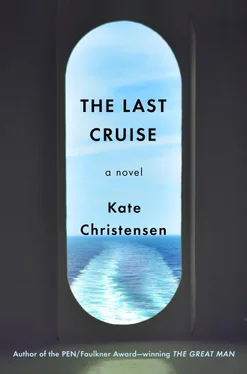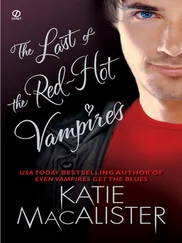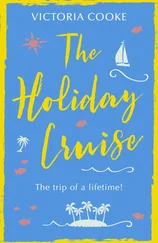“Hey, Val,” she said.
“Hey, Chris,” said Valerie, scissoring her legs and making snow angels with her arms, her hair spreading around her head. “I kind of wish I’d brought my shampoo down. My scalp is so itchy.”
“Why did you pick this cruise?”
“What do you mean?”
“Why didn’t you take a cruise on a new megaship instead? With Wi-Fi?”
Valerie did a couple of slow underwater horizontal jumping jacks while she thought about this. She looked like a giant pale, smooth starfish. “I thought it would be good for me to give up the Internet for a while. I was so wrong.”
“Wrong about giving up Internet, or picking this cruise?”
“Well, this cruise was obviously a colossally bad choice. To put it mildly. But what I really learned is that life without the Internet is not very interesting. I just feel like I’m missing out, I’m not in touch, I’m off in some slow lane. What’s wrong with being online all the time? It’s not like anything is happening anywhere else. Take this cruise. String quartets. Old people. Stuffy food. The library is full of old books no one reads anymore.”
Christine laughed. “Philistine.”
“I am not,” said Valerie, but she laughed too. “The ocean feels smaller than it used to. Everything feels smaller. Doesn’t it? Or is it just me?”
“It’s just you,” said Christine.
They were silent awhile, suspended there together while tiny waves lapped at their skin. Christine looked up at the Isabella, feeling like an explorer or an astronaut who’d left the mother ship, ventured away for the first time, and was looking back at it from the void of space. Seen from here, the ship looked small and alone, the only shelter and protection for these hundreds of souls who clung to her creaky old frame. But she also looked reassuring, human-scaled in all that depthless blue, elegant and starkly white in the sunlight, all her curves and stacked terraced decks soaring above the sea surface.
She was aware all of a sudden of music coming from an upper deck of the ship. Two stringed instruments, it sounded like, playing a fugue-like duet that burst on the still, hot air in gusts of notes, liquid and rippling, orderly, resonant, civilized. Under the music, she heard another sound. The engine of a plane, far off. She heard yells behind her and turned to look at the platform. Several uniformed crewmembers were inflating a yellow life raft. As the engine noise grew, drowning out the music, she watched, treading water, as a big cargo plane approached and banked, circling the ship. Then a square door in its rear opened and a large red crate attached to two parachutes came floating down, landing with a splash a few hundred feet away.
As a second crate fell down she heard cheers, whistles, whoops, and yells all around her, as if they were all refugees in a camp or victims of a natural disaster, watching FEMA or NATO trucks arrive with water and bags of rice. As the crew launched the raft and began to row out to the bobbing crates, Christine could feel, vicariously, how exhilarating it must be for them to be headed somewhere, in charge of their own small craft, with a tangible reward awaiting them, not so far away. The plane flew off, its sounds fading to a faint drone, then a buzz, then an echoing memory of an engine. She thought of Mick in the galley, his joy and relief at getting all this food.
*
A chain of workers took boxes out of the two crates on their floating pallets and passed them one by one from the loading bay up to the main galley. Mick stood by the main galley pass, inspecting each box as it arrived. He thought of his predawn food inspection, before the cruise had begun, on the docks of Long Beach so long ago, the oysters and broccoli, steaks and pineapple. This time it was whole wheat sandwich bread, peanut butter, power bars, packages of dried fruit and nuts, baby carrots nestled together like squat orange fingers. Crewmembers came in waves, with box after box, walkouts working together with Mick’s team as if they had been one crew all along. Mick heard snatches of singing, laughter, shouted banter in English, Spanish, a couple of other languages he didn’t recognize. Consuelo and Jean-Luc joined the chain, humping boxes up the stairwell, conducting periodic quality-control checks to make sure no one filched anything. It all felt surreal, after Mick’s morning of near-solitary stasis in the galley, as if he were standing in the midst of a whirlwind ballet of coordinated and kinetic goodwill, as if the plane had miraculously caused everyone to forget his or her own personal grievances and share eagerly in the communal good fortune of them all.
“Heavy one,” said Camille as she maneuvered backward through the doors. She dumped her box on the floor and went out again as Mick sliced it open and found it packed with cans of milk.
“This one goes in the breakfast stash,” he told a walkout named Kalyani, who had just hustled up behind him. He knew her from the prep station, back in the old days. “With the cereal boxes.”
“Milk,” said Kalyani with mock-scorn. “Who drinks milk ?” She gave him a brief frank grin, which seemed to acknowledge that the walkouts had given up, come back to the fold. About time, thought Mick.
“Babies,” said another walkout named Chita, breezing in with a fresh box and dropping it with a dramatic sigh as if it weighed a hundred pounds.
As Mick stood up, bracing himself for the next box, he felt a hand on his shoulder. “Do you need any help?”
He turned to see who it was and almost gasped aloud. Christine wore a sea-green bathing suit. Her hair streamed over her shoulders. She was so close, he could smell saltwater, feel the waves of coolness coming off her. A long piece of hair had stuck to her neck like a tendril. She was gorgeous, muscular and fit from physical labor, a real woman with breasts, hips he wanted to rest his hands on, strong shoulders and thighs. He had to blink a few times.
“There’s nothing to cook,” he managed to say. He could still feel the cool weight of her hand on his shoulder though she’d taken it off. “It’s all ready-to-eat stuff.”
“We went swimming,” she said. “It was amazing. You should go.”
“I can’t swim.” He had never admitted that to anyone before. And certainly not to a woman he was attracted to.
“Oh, come on,” she said warmly. “Why not?”
“I never learned. No one taught me. I know, it’s stupid.”
She didn’t hesitate. “I’ll teach you.”
“I’m a bad student.”
She laughed, eyes sparkling. “You’re sure you don’t need help down here?”
He wanted to kiss her. “No,” he replied. “I’m okay, you can take the rest of the day off, too.” Why had he said that, when he meant and wanted exactly the opposite? “But maybe I’ll see you later, upstairs,” he added.
“Okay,” she said, already on her way out, over her shoulder. “See you later.”
He watched her go, the smooth bare skin of her strong back above her lovely round American ass, cupped by her bikini bottoms. He’d been so oblivious before now. And she’d been wearing baggy shorts and T-shirts.
“Hey, cabrón. ” Consuelo snapped her fingers in front of his face. “Quit drooling and check this out.”
He realized his mouth was hanging open a little. As the woman of his dreams vanished through the swinging doors, he looked down at a box Consuelo was pointing at, packed with cans of crabmeat.
“Who’s your girlfriend, Chef?” She grinned at him.
“None of your business,” he said, but he grinned back at her.
The next two boxes held dozens and dozens of croissants. Mick chuckled and shook his head. Seriously? Fucking pastry? His earlier solitary depression had lifted, and he now felt all his senses and forces gathering behind one clear and definite thought: I want Christine. No more regrets about the life he could have had or fear of the gods punishing him for overreaching. There was no going back. And there were no gods. Fuck it, he thought. I don’t care if she’s married. I want her. I want to have what I want, for once in my life.
Читать дальше












